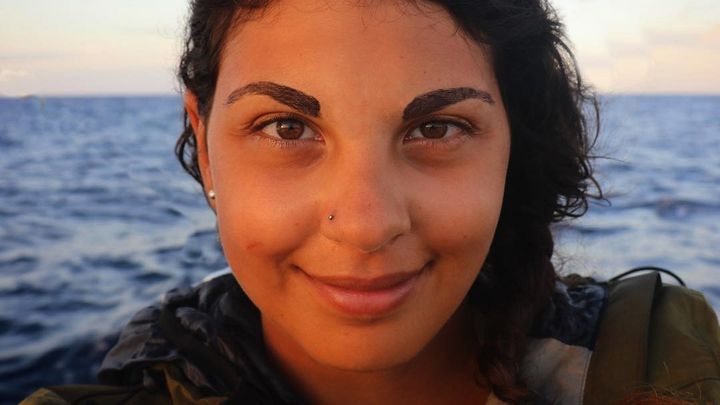
eXXpedition Round the World Leg 2, Atlantic X-ing!
Donation protected
Big news! I was accepted to sail on eXXpedition's Round the World journey, a 2-year sailing adventure that will take 300 women around the world, more than 38,000 nautical miles, during 30 voyages. The purpose: Explore plastics and toxics in the oceans as an all-female crew, to help uncover new information about our oceans and our own health as females in this polluted world.
The Round the World journey will take me from the Azores Islands to Antigua–an Atlantic crossing, which would happen this October-November! This is an experience I would be honored to document in my writing, film and photography, and would also like to share as part of my lecture series on plastic pollution and my global expeditions bearing witness to the problem.
I am asking for help to raise the $8,700 to pay for my food, ship fuel and part on the boat, as well as $1,500 to pay for my flights to the Azores and back home from Antigua. Learn more about eXXpedition's Round the World project here. To date, my expeditions have been almost entirely self-funded save for the few fellowships I have earned with the Safina Center and other occasional supporters. Your help is so appreciated, even if you're able to give just a few dollars.
My hope is that you will feel compelled to donate, so that I can create my unbiased and boundary pushing photojournalism works about plastic pollution. Ideally these works will benefit all life on Earth. As many of you know, I have twice sailed the Pacific Ocean covering the story of plastic pollution, and my materials from those trips and my other plastic expeditions across the globe have appeared widely in popular media. This includes on NPR Radio, in my more than 50 lectures to date, dozens of online articles and even in a Scientific American feature that conservation advocate Leonardo di Caprio shared through his social media platforms!
Why is plastic in the oceans a problem? Not only does it entangle and choke marine wildlife, but it's entering humans' bodies via the food supply, drinking water and even the air. The smallest pieces of plastic–called microplastics–often contain toxic chemicals that can harm living organisms, causing hormone problems and other health issues. I've extensively covered this issue in my photojournalism works and lectures.
 Photo: Microplastic found in the surf on Kamilo Beach, Hawaii. ©Erica Cirino
Photo: Microplastic found in the surf on Kamilo Beach, Hawaii. ©Erica Cirino
Have a question? Reach out to me! http://www.ericacirino.com/contact
Thank you/Mahalo/Grazie/Tak/Obrigado/Gracias/....
~erica~
photojournalist
http://ericacirino.com/
The Round the World journey will take me from the Azores Islands to Antigua–an Atlantic crossing, which would happen this October-November! This is an experience I would be honored to document in my writing, film and photography, and would also like to share as part of my lecture series on plastic pollution and my global expeditions bearing witness to the problem.
I am asking for help to raise the $8,700 to pay for my food, ship fuel and part on the boat, as well as $1,500 to pay for my flights to the Azores and back home from Antigua. Learn more about eXXpedition's Round the World project here. To date, my expeditions have been almost entirely self-funded save for the few fellowships I have earned with the Safina Center and other occasional supporters. Your help is so appreciated, even if you're able to give just a few dollars.
My hope is that you will feel compelled to donate, so that I can create my unbiased and boundary pushing photojournalism works about plastic pollution. Ideally these works will benefit all life on Earth. As many of you know, I have twice sailed the Pacific Ocean covering the story of plastic pollution, and my materials from those trips and my other plastic expeditions across the globe have appeared widely in popular media. This includes on NPR Radio, in my more than 50 lectures to date, dozens of online articles and even in a Scientific American feature that conservation advocate Leonardo di Caprio shared through his social media platforms!
Why is plastic in the oceans a problem? Not only does it entangle and choke marine wildlife, but it's entering humans' bodies via the food supply, drinking water and even the air. The smallest pieces of plastic–called microplastics–often contain toxic chemicals that can harm living organisms, causing hormone problems and other health issues. I've extensively covered this issue in my photojournalism works and lectures.
 Photo: Microplastic found in the surf on Kamilo Beach, Hawaii. ©Erica Cirino
Photo: Microplastic found in the surf on Kamilo Beach, Hawaii. ©Erica CirinoHave a question? Reach out to me! http://www.ericacirino.com/contact
Thank you/Mahalo/Grazie/Tak/Obrigado/Gracias/....
~erica~
photojournalist
http://ericacirino.com/
Organizer
Erica Cirino
Organizer